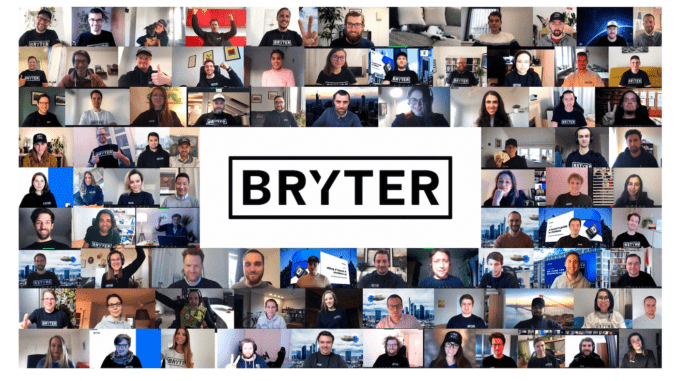
Decision automation company BRYTER has bagged $66m in a Series B funding round, reaching $90m in total investment in just three years, making it by Artificial Lawyer’s reckoning the first legal tech company to reach this level of growth funding so rapidly from a standing start.
In fact, it’s quite possible that BRYTER, which is based in Berlin, but has offices in the US and UK, has now received more VC investment than the entire German legal tech sector combined over the same three year period.
The company currently has about 120 staff and will aim to grow to 200 by the end of this year. The additional money, which comes just eight months after the last round, will be partly invested into expansion in the US – the largest legal market on the planet.
The latest funding was led by New York based investment firm Tiger Global, with participation from existing investors Accel, Dawn Capital, Notion Capital and Cavalry Ventures. Ulf Zetterberg, the former CEO of legal AI company, Seal Software, has also become an investor and an advisor to BRYTER, although he made his investment a few months ago.
All in all, it’s quite an achievement, especially given that several no-code (or low code) legal tech companies that also help with decision automation pre-date BRYTER’s launch.
So, what is their secret sauce? How did BRYTER go from $0 to $90m funding in so short a time, and grow so fast, winning around 100 clients including ING, Telefonica, Baker McKenzie and PwC along the way?
As founder and CEO, Michael Grupp, explained to this site, their goal has been to focus on the stuff that may not seem exciting, but actually works and that really does provide ROI, because when you bring in no-code decision automation it speeds up processes and makes them easier for a business, and that in turn saves money. That money saving can be clearly explained to the company’s CFO and so support for BRYTER grows across a business.
Of course, that may sound simple, but turning complex processes into something that feels intuitive and provides a clearly tangible benefit has always been the Holy Grail of software companies.
‘There is no secret sauce for us, we just focus on a solution that brings ROI today. People want ROI and BRYTER just works,’ he said.
‘But, there is also something about timing, [to grow as we have] you need companies that are thinking about these things. You need GCs and heads of compliance to be thinking about [this kind of solution]. You need them to be looking at this process that currently costs X, and [considering that] with BRYTER it will now cost Y,’ he explained.
And there is a lot of truth to that. Being early, or being late, can be a cruel fact of life for many startups. BRYTER seemed to arrive just as no-code applications saw a surge of interest, and just as inhouse teams were really getting to grips with automation.
But, there is one other aspect – and it reminds Artificial Lawyer of what Agiloft’s CEO, Eric Laughlin, said to this site recently: it’s also about having an enterprise mindset. I.e. to stop thinking small and to approach large businesses in the same way Salesforce approaches them.
As Grupp explained, any company with around $200m in revenue would be a good fit for BRYTER’s capabilities. And there are thousands of such companies across the planet. Not all legal tech companies think in this way. Although, to be fair, if your product is tailored for mostly the Top 50 largest transactional law firms in the world, then such an enterprise approach is tricky because the numbers are just not there.
Grupp added that the main investor in this round, Tiger Global, has a new multi-billion dollar fund and with their continued support ‘if we want to go big, we can’.
At this point, Artificial Lawyer asked: given how fast you are growing won’t you aim to sell soon, to benefit from that during a market that is hot for M&A? Grupp said: no, certainly not now. They have only been going for three years, the team is young and dynamic, and there is so much more expansion ahead of them. There is far more growth in the US to come, and then there is the Asia-Pacific region to expand into.
And when you hear how Grupp sees things you can understand that from his point of view this really is just the beginning. He points to RPA pioneer UiPath, which now has annual revenues of $0.6 billion, as a potential model for the path BRYTER could take in terms of future growth.
‘UiPath were ten years before us, they were the first wave, and we’d love to be in the second wave,’ Grupp concluded.
But, the last word goes to key investor, John Curtius, Partner at Tiger Global, who said in a statement: ‘BRYTER has all the characteristics of a top-tier software company: high quality product that solves a real customer pain point, a large market opportunity and a world-class founding team. The feedback from BRYTER’s customers was resoundingly positive in our research, and we are excited to see the company reach new heights over the coming years.’
Good luck to all the team at BRYTER. Their success is ultimately good news for many other companies in the legal tech world, as it is sending the message that software businesses that originate in the legal sector can have huge potential.
1 Trackback / Pingback
Comments are closed.